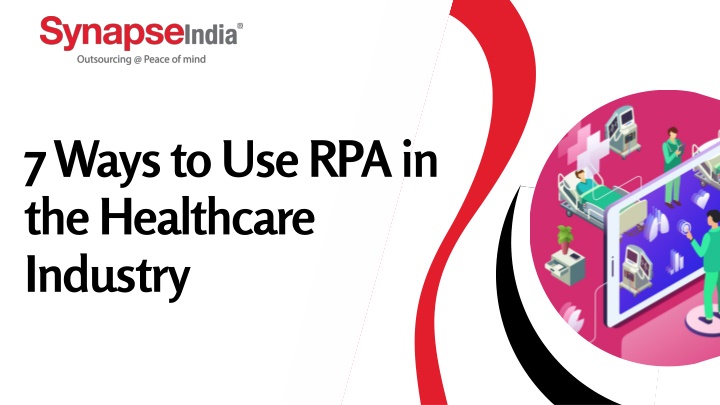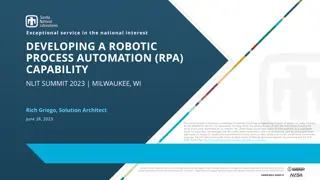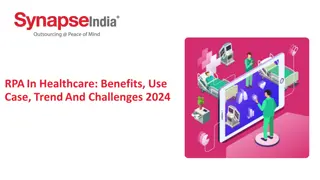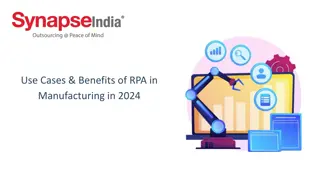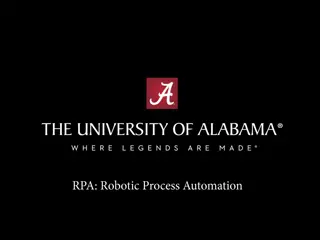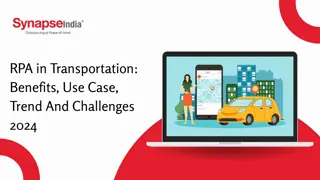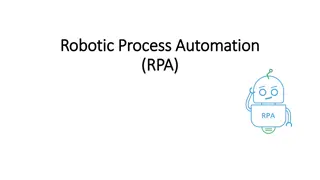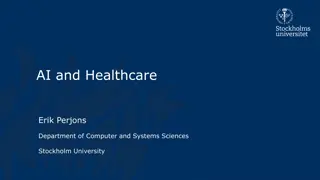7 Key RPA Applications in Healthcare You Should Know
Discover seven key applications of RPA in healthcare that can elevate your organizationu2019s efficiency and patient care. From automating appointment scheduling to managing billing processes, our guide provides a roadmap for implementing RPA soluti
Uploaded on Aug 09, 2024 | 10 Views
Download Presentation

Please find below an Image/Link to download the presentation.
The content on the website is provided AS IS for your information and personal use only. It may not be sold, licensed, or shared on other websites without obtaining consent from the author.If you encounter any issues during the download, it is possible that the publisher has removed the file from their server.
You are allowed to download the files provided on this website for personal or commercial use, subject to the condition that they are used lawfully. All files are the property of their respective owners.
The content on the website is provided AS IS for your information and personal use only. It may not be sold, licensed, or shared on other websites without obtaining consent from the author.
E N D
Presentation Transcript
7 Ways to Use RPA in the Healthcare Industry
Introduction to RPA in Healthcare Robotic Process Automation (RPA) is a technology that leverages software robots or "bots" to automate repetitive, rule-based tasks typically performed by humans. In the healthcare industry, where efficiency and accuracy are paramount, RPA is rapidly becoming a crucial tool to streamline operations, reduce costs, and improve patient care.
Streamlining Appointment Scheduling RPA automates bookings, cancellations, and reminders, reducing human errors. Increases appointment adherence, minimizes no-shows, and allows healthcare staff to focus on essential patient care services. Enhances patient experience by making appointment processes smoother and more reliable.
Processing Insurance Claims RPA verification, expediting approvals. Faster claim processing ensures quicker reimbursements, improving satisfaction and management. Reduces manual errors, which can delay claims and cause patient dissatisfaction. automates data entry and claim both cash patient flow hospital
Managing Patient Records RPA automates the extraction, updating, and maintenance of patient records, ensuring compliance with regulations like HIPAA. Enhances the accuracy and accessibility of patient data, allowing healthcare providers to make informed decisions more rapidly. Improves patient care through streamlined access to comprehensive medical histories.
Improving Billing Accuracy and Efficiency RPA automates invoice generation, payment processing, and billing queries. Reduces billing cycle time, improving cash flow and ensuring timely payments. Enhances patient satisfaction by eliminating billing errors and disputes, making payment processes smoother.
Optimizing Healthcare Supply Chains RPA ensuring timely ordering and restocking of supplies. Prevents supply shortages and reduces wastage by optimizing inventory levels. Ensures healthcare facilities always have necessary medical supplies on hand, supporting better patient care. automates inventory management,
Conclusion & Questions Recap of seven key RPA applications in healthcare, emphasizing their impact on efficiency and patient care. Encouraging healthcare consider RPA for enhancing their operational efficiency. Thank the audience and invite them to ask questions or discuss further implementations of RPA in healthcare organizations to
Contact Us www.synapseindia.com info@synapseindia.com +18557962773
